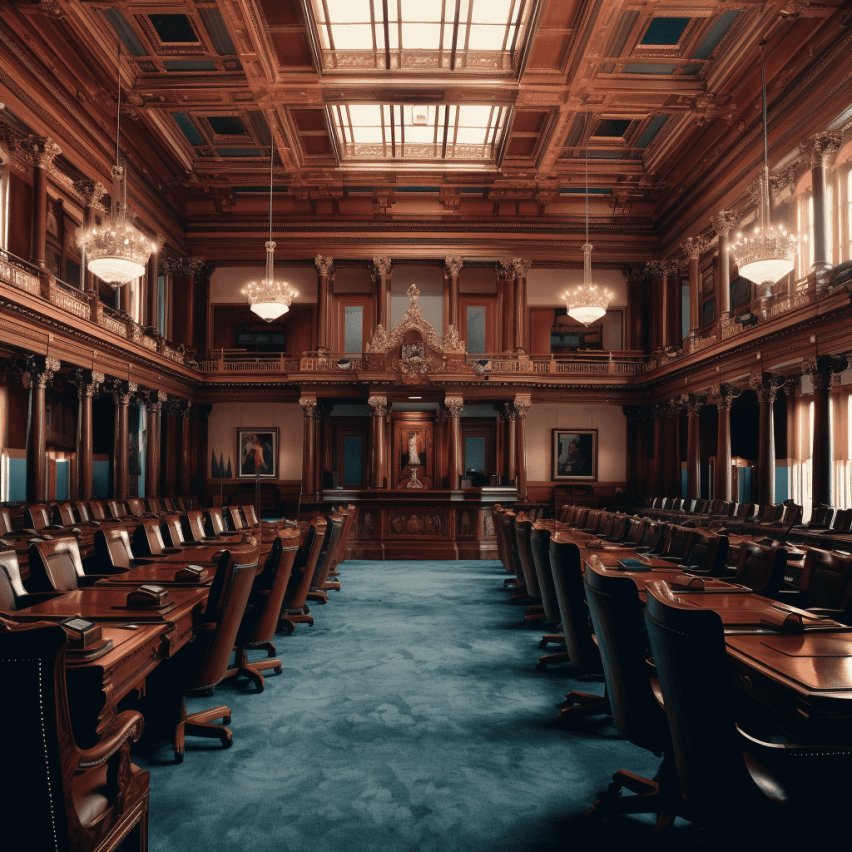
The Main Purpose of State Legislatures: A Comprehensive Guide
A state legislature is a representative governing body that is responsible for making state laws in a particular state, province, or other legislative district.
In the United States, there are 50 states, where 27 US states call their legislative branch the State Legislature, 19 states call their legislatures the General Assembly, and the 4 remaining legislatures are:
Massachusetts - Massachusetts General Court New Hampshire - General Court North Dakota - Legislative Assembly Oregon - State Legislative Assembly
The legislature comprises two houses, namely the House of Representatives and the Senate, which are commonly referred to as bicameral legislature. However, a state like Nebraska has a unicameral legislature meaning it has only one legislative body, which is the Senate.
The State legislature is of great significance in the US political system because bills initiated at the national level are sent to state legislatures for approval. Moreover, they play an essential role in selecting state governors who are responsible for filling in the vacant positions of state political offices. For instance, if a US senator or a representative dies or resigns, then they are replaced through the legislatures, which empower the governor to appoint a replacement to complete the term or to hold office until a special election can take place.
Functions and Powers of State Legislatures
The legislatures undertake numerous functions and powers. Some of the common functions of state legislatures conferred through the Constitution include:
1. Legislative authority
In today’s democratic society, they are primary institutions that are primarily tasked with the legislative process that make the laws governing the community. Passing laws is their primary function in most states.
2. Appropriate funds for the annual state budget
The majority of legislatures have the power to appropriate funds for the administration of their activities. Some legislatures may require the governor to submit a budget request before they can perform the legislative oversight role required to authorize the expenditure of any money that is needed to meet the budgeted projects or programs. They are the custodians of the National Treasury.
3. Establish state agencies and departments
The establishment of agencies and departments, such as education, health, justice, etc. Legislative functions are mainly performed by legislatures.
4. Election of state officials
The legislature is responsible for managing the elections of state officials. They may hold a referendum for the election of state officials, or they may appoint a governor to carry out the election process. They also organize various political parties as necessary.
5. Passing appropriations bills
They are also tasked with making funding for all the social, economic, and educational programs within their states.
In addition, they have the power to approve Presidential nominations, control the budget, and can impeach the President and remove him or her from office. The powers and functions of legislatures vary from one state to another. However, the main state legislature responsibilities are to pass laws and appropriate funds for government activities.
Representation and Democracy
The legislature plays a crucial role in ensuring that there is democracy in decision-making and representing diverse interests within a state. As the representative bodies of the people, they are designed. The legislature reflects the will of the citizens and provides a platform for debate, deliberation, and the creation of laws and policies that affect the state's residents.
To ensure that these legislatures accurately represent the communities they serve, they are elected by the people in the areas they represent, such as the counties. For example, in the US, the House of Representatives is elected by the people, while the Senate members are chosen by the legislature.
They also have several ways of ensuring that their representatives accurately reflect and represent citizens’ views and interests. They include the appointment of the members who hold office for life terms, the proportionality of representation where no state can have more than one-third of the Senate's seats, parliamentary rules that dictate how to conduct the membership voting and the time allowed for debates.
In addition, legislatures have the power to set legislative rules and procedures for the conduct of business and decide how elections are held and by what procedure.
The Role of Legislature in Policy Making
Legislature plays a crucial role in shaping the policies and laws at the state level. The legislature often undertakes its primary responsibility of making law by introducing bills, debating on them, and passing them.
They are responsible for the ideation and bill drafting. The process of making a law starts with the introduction of a bill to the legislature. The bill may have been initiated by state representatives or state senators.
The bills are referred to different committees by the leaders of both houses. The committees consider whether the proposed bill is in the state's interest and advice if it should be passed. If passed, the bills are sent back to both houses for adoption and then forwarded to the governor. The governor then signs it into law or vetoes it, which requires voting by a two-thirds majority in joint legislative sessions of both houses to overrule the veto.
The number of bills introduced in the legislature varies from one year to another, depending on political issues. In some states, bills may be introduced on the same day, while in others, it takes more time to introduce new bills. Furthermore, it can take up to three months for the bill to be passed by both houses and forwarded to the governor for signature to become state regulations.
Rather than the creation of law, legislatures are responsible for proposing and adopting policies that are needed in the jurisdiction. They discuss ideas from various sources, such as lobby groups, media releases, public opinion polls, and personal knowledge of members of the legislature.
The ideas discussed include: • Accountability of government officials. • Improving service delivery of different government agencies to citizens. • Increasing employment, among others.
The Role of Legislatures in Checks and Balances
The role of State legislatures in checks and balances is one of the reasons why they are essential in democratic governance. The three arms of government at every level, be it national or state (executive, legislature, and judiciary), are interconnected by the fact that each arm performs different functions, but each has the capacity to check excesses by the other.
Each arm can check the other by making systematic checks, which include powers to protect the country's interests, setting rules and procedures for the conduct of business, and appointing members to boards and commissions. For example, in Texas, each chamber of the legislature can pass a veto-proof bill to overrule any law passed by the executive or judicial branches and those powers is referred to as legislative powers.
Moreover, the separation of powers between the branches of government enables each to carry out governmental functions without the other being able to usurp its powers due to the other's incompetence. This is a key factor in checks and balances because it prevents any one of the three arms from becoming too powerful by dividing their votes, thereby allowing a particular arm to become overbearing.
An equally important role of the state's legislature is to hold the government accountable for its actions. This is referred to as oversight. This is where legislators check what the government is doing and whether it complies with legislation that has been passed by them in order to ensure that taxpayer funds are properly managed and used for designated purposes accordingly.
State Legislative Committees
Legislative Committees play an essential role in the functioning of state legislatures. The function of these committees in the legislature is to assist with the formulation of policies, laws, and legislation. They are also expected to check government officials' activities against the intent of laws passed by the legislature.
They are responsible for creating or formulating different committee hearings that will deal with different issues and issues that need immediate attention. For example, the committee on highways and public transportation is formed to discuss the construction of different roads, bridges, overpasses, and other public works.
Other committees include the Committees of Commerce, agriculture, and Bills. These committees have a wide range of responsibilities with regard to legislation passed by both houses. They are responsible for considering laws that relate to business regulation, among other issues. They also check proposals relating to environmental quality and alcohol-banned substances in motion pictures and videos.
A committee's role is to consider laws as proposed by the lawmaking departments. It also ensures that these proposals are compatible with the existing laws of the state legislature. It also checks if the department has enough funds to implement these proposals and if, given the proposed budget, it is sufficient for funding such plans.
Committees play an essential role in policy development and making laws that govern the daily lives of citizens. Since the policy is created by law on a legislative level, it is vital that committees help the representatives to make laws that they can implement in their jurisdiction. Although committees can assist with the formulation of laws, they can also be used to prevent specific bills from being passed. This is because it allows legislators to ensure that all laws passed are compatible with their ideologies and constitutional requirements.
Interactions with Federal Government
The legislature is in constant interaction with the federal government. The federal government, through its aid programs, is expected to help states in certain areas by providing funds to improve infrastructure and running schools or other public services. For example, the federal government can pay for education if there are not enough state funds. However, this can become a problem if there is no law enforcement limiting which types of programs national aid can be used for.
Interactions with the federal government often give legislators a chance to discuss federal policies. For example, if they find that some of the provisions in a national policy will not help their constituents, they can use their expertise to influence the federal government's policies. This can be done by giving suggestions and recommendations on how national policies will affect them politically as well as otherwise. This is because the legislature is made up of representatives from each constituency, which in turn means that they have a wide range of experiences from which they can draw conclusions and make recommendations.
The extent of interactions between the state governance and legislature largely depends on the number of programs that will be implemented in their state. These programs will require cooperation and interaction between the two to ensure they are carried out effectively.
Impact on Local Communities
Legislatures have a direct impact on local communities in several ways. In terms of education, states have been able to pass laws that require students to attend school for a minimum number of years. This is meant to ensure that children are offered at least the minimum education they need as individuals and the country as a whole.
They also deal with infrastructure through the amendments they make in various bills. For example, bills concerning infrastructure are usually passed during budget appropriations. Since state legislatures deal with such issues, they have a direct impact on towns and cities in their jurisdiction.
They also influence the development of towns and cities through the use of funds that are collected at the state level. For example, if a state wants to develop public schools, it reveals a budget plan that will be used to build new schools in certain towns and communities within its jurisdiction.
The legislatures also influence local communities through laws they make affecting health care. For instance, the state constitution may require all people to have healthcare coverage. This means that all people who are living in the state must be covered by the health care system. The legislature will then devise policies to ensure that such laws are followed, and this is done by passing bills or other laws that require people in their jurisdiction to have health care coverage.
Legislatures have a direct impact on local communities through their policies, laws, and regulations concerning infrastructure, education, and healthcare.
Impact on Economic and Social Development
When the legislature creates state statutes that are relevant to economic and social development, they can improve the lives of their constituents. For example, legislatures need to create laws that encourage job creation as well as the expansion of industries. This can be done in several ways, and one way is through tax reduction measures. This is effective because it encourages investment by businesses in their respective local communities. Investments made by businesses in states with lower taxes will lead to more jobs being created. This again has a direct impact on the life of people living in these states.
Impact on Health and Safety
Legislatures also affect the health and safety of their local communities. For instance, state governments can pass laws requiring all drivers to be licensed, which can lead to the reduction of traffic accidents and injuries made by drivers. On another note, state governments can pass laws that require public hospitals and healthcare facilities to have particular equipment to ensure that patients are given adequate care during surgical procedures. This helps ensure that health in the state is at a good standard at all times. Many of the above-listed laws are introduced by members of the legislature who can do so because they have a good understanding of their communities. This is also because they have a lot of experience in dealing with local communities and how they function. It is because these people understand local needs and problems they can come up with state policymaking and constituent services that can help improve their lives.
Electoral Process and Term Limits
The electoral process for legislators in state-level politics is largely controlled by their political parties. In most states, the political party decides on who will run for election as a legislator. Under the electoral system in place, a party's slate of candidates in a particular district is chosen at a primary election and then run by the party against other party candidates. The winner of that contest will be elected to the legislature.
In most states, legislators are elected every two years. However, many states do not have term limits for legislators. In states with term limits, like California, there is an eight-year limit for terms in the state legislature. If a legislator steps down before the end of his or her term, that seat is filled by a special election. If that seat is vacated after the term has ended, then it remains vacant until the next session begins.
The role of political parties in the electoral process is significant. The fact that political parties are involved in determining who will run for state-level legislation positions makes it difficult for independent candidates to get into the positions.
This is because the political parties can restrict the number of candidates who can run from being elected. Moreover, since political parties are involved in determining who will run for state legislature positions, it makes it easier for the political parties to impose their ideology on an entire state. This makes it possible because the candidate representing a party will be elected due to the votes of the people who vote in favor of that party, even though they may not agree with all the policies of the party or its leader.
Public Engagement and Advocacy
Legislatures are important not only because they help determine how state leaders are going to run their respective communities, but they also help people be able to have a voice in the decisions that are being made. They do this by creating a system that is effective and simple for people to use. The main aim of this system is to make it possible for people who live in these states, whether they are politicians or regular citizens, to lobby state legislators on issues that are important to them. For this to happen, there should be a system that is effective and easy to use.
One of the systems that can help with this is the use of the Internet. The Internet does not just make it possible for people who live in these states to become aware of what is happening in the state legislature. Still, it also helps people lobby state legislators on issues that are important to them. This means that individuals can work together to determine how their communities should be run and what issues they want these leaders to address.
Legislators and their Committees are responsible for state-level decision-making roles and responsibilities of each committee. Each committee is tasked with a different function, which is essential to ensuring state legislators are providing a strong voice for their constituents.
The most critical role that legislatures play in terms of informing citizens about key public policy issues is by conducting hearings on issues of concern to the public. These hearings often focus on controversial topics such as mental health issues, education reform, and domestic violence.
These hearings often require the use of expert witnesses and legislators to ask questions that are intended to clarify issues. During these hearings, the role of the Committee members is to seek clarification on issues that are important to their constituents.
State legislatures are very important because they help determine how the state leadership will run their respective state and communities. Therefore, Support candidates who prioritize effective state legislation and a proper understanding of the will of their communities.
Get free tools to help you run for state legislature with confidence.

